Conscious Discipline at Storyland Preschool:
Benefits to Your Child
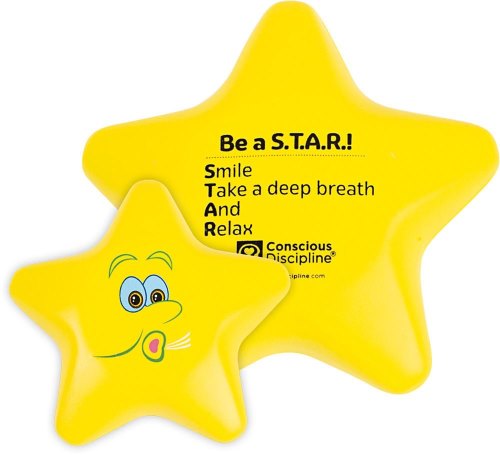 Source: Conscious Discipline
Source: Conscious DisciplineCreated by Dr. Becky Bailey, Conscious Discipline® is based on current brain research, child development and developmentally appropriate practices, and is built on the foundation that discipline should not be applied to children, but rather should be developed within the child.
Storyland Preschool is pleased to announce that they have incorporated this discipline approach into its program. Although we are using it in the classroom, it can be applied equally well in the home where parents apply the principles learned in this approach.
In a nutshell, Dr. Bailey's program is research based and integrates social-emotional learning and development into a process that teaches self-regulation to children, as well as adults. This approach is not like traditional attempts at disciplining a child that uses rewards and punishments, but rather relies on setting achievable goals, managing emotions, understanding personal boundaries, teaching mutual respect and conflict resolution.
Most of us are familiar with the traditional approaches that rely on rules that are upheld through consequences. The goal of consequences is to obtain obedience from the child. If a child is compliant, he is rewarded, if he is not, he is punished.
This traditional approach is based on the premise that we are capable of controlling others through changing the environment in some way. This is very familiar to most parents and teachers, but Conscious Discipline offers a new approach that empowers the adult to venture onto a lifelong process of personal growth.
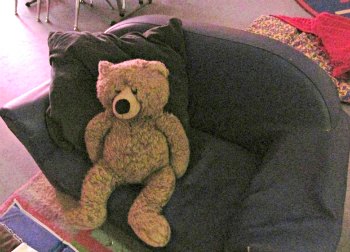 |
Jana and Shelby's Safe Place
Children who are stressed, having a difficult day, or need to regain composure after an emotional outburst have a safe place to go that is comfortable and calming. |
Our teachers are learning that this approach teaches better ways to set limits, communicate, and improves the adult-child relationship. The ultimate goal is to implant in the child an internal motivation to behave appropriately.
This approach leads teachers (and parents) through a process that promotes permanent changes in both children and the adults. As we, the adults make changes in ourselves; we see profound changes in others around us.
Conscious Discipline empowers teachers (and parents) with seven powers for self-control. These powers help create a peaceful inner state that allows us to stay in control. As our emotional intelligence is increased, we see changes in the child’s self-control and ability to make good choices.
The Seven Powers
- Power of Perception: No one can make you mad without your permission.
- Power of Unity: We are all in this together.
- Power of Attention: What you focus on, you get more of.
- Power of Free Will: The only person you can make a change is yourself.
- Power of Love: See the best in others
- Power of Acceptance: The moment is as it is.
- Power of Intention: Conflict is an opportunity to teach.
From these powers, The Conscious
Discipline approach outlines 7 basic skills we need to discipline. They are the only skills needed by a teacher
or parent to respond to any type of behavior.
The Seven Skills
- Composure: Becoming the person you want children to be.
- Encouragement: Building a school family
- Assertiveness: Saying “no” and being heard.
- Choices: Building self-esteem and willpower
- Positive Intent: Creating teaching moments
- Empathy: Handling the fussing and the fits
- Consequences: Helping children learn from their mistakes.
By implementing these powers and skills together, we learn to how to stay in control of ourselves and charge of children in a way that copies the same skills we want to teach. While employing these powers and using these skills teachers and caregivers teach children seven essential life values and seven basic social skills.
Seven Essential Life Values
|
Seven Basic Social Skills
|
Why a School Family?
Jana & Shelby's Family Board
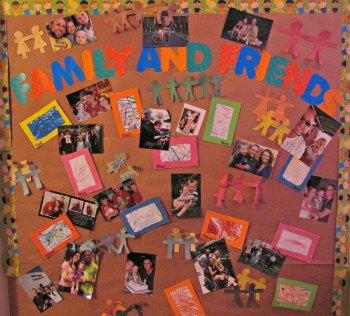 |
When we think of schools, the factor model comes to mind. The factory’s purpose is to create standardized products where each is accepted or rejected based on how well the product conforms to what we believe is the idea. Conscious Discipline asserts that the new metaphor or model is needed to describe our schools. This new design, the School Family is built on a healthy family principle, where the goal of health families is to provide an opportunity for optimal development of each member. The School family builds relationships between families and schools, teachers and students to ensure that all develop optimally. |
These connections provide the three essential ingredients for school success:
A Willingness to Learn
Without willingness, each interaction between teacher and child becomes a power struggle instead of learning opportunity. The School Family brings all children, especially the most difficult, to a place of willingness through a sense of belonging.
Impulse Control
Building connections to others allows connects in the brain to form that aids children in impulse control. If a child is disconnected, he or she is likely to be disruptive, aggressive or show signs of shutting down. By using the School Family connection children develop impulse control and give teachers the opportunity to teach self-regulation skills within the context of activities and learning opportunities.
Attention
The School Family connect that is embraced helps to reduce stress by creating a caring, encouraging atmosphere. If stress is reduced from the equation, attention increases.
Jana and Shelby's Rule Cards

Impulse control: Children who do not feel connected in one way or another are disruptive. External reward/punishment systems cannot improve a child’s ability to self-regulate because they are not designed to teach new skills. The School Family uses connection to encourage impulse control and teaches self-regulation skills in the context.
Attention: The School Family reduces stress while creating an atmosphere of caring, encouragement and meaningful contributions. These components are necessary for children to develop and apply sustained attention.
What does a Center Using Conscious Discipline
Look Like?
|
Allison's Helper Chart
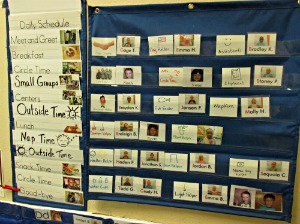 Amanda's Friends Board
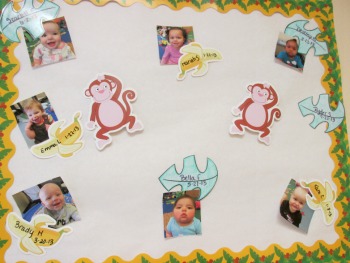 Heather M.'s Celebration Box
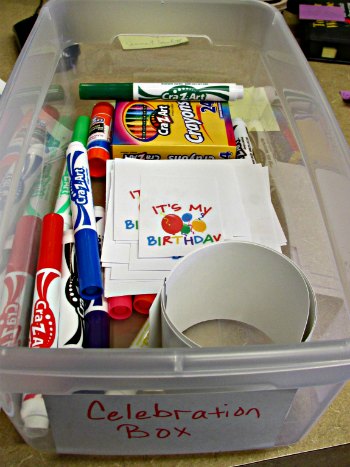 |
Further Reading and Resources
In review, Conscious Discipline is an approach to discipline that encourages the adult to change so the child will too. The goal is to transform a child with an attitude of “what’s in it for me,” to “What can I do for you.” The approach has been used in many different settings and many different age groups from the very young to adults. It is an approach that works on all children, form those with major behavioral problems to those with developmental delays. At Storyland, we are anticipating and expecting great results from this method.
We want our children to grow up to be responsible adults who are able to control their emotions, make appropriate choices based on the internal motivation to do what is right. This program can be used in the home as well as the school with some modifications. If you are interested in learning more about the program, there are several websites you can visit and books you can buy. These resources are listed below.
The following books are part of the Conscious Discipline Program and are highly recommended. We are using all of them at Storyland, but the one we consider to be our "textbook" is
This book is intended to be used in a school setting, but covers the entire approach very well. If you purchase only one book, this might be the one you might like to try.
These are all books used at Storyland also. You can purchase them on Amazon through the links on this page. Click on a book to learn more about it. (Storyland receives a tiny commission from any product purchased through this site and this helps to defray the costs of maintaining this website.)



